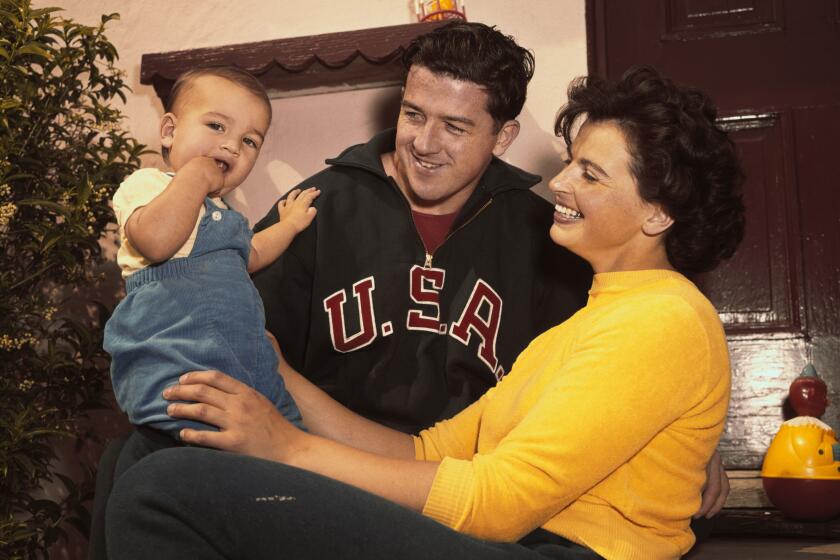Cuban Boxers Strongest, Saddest Team at Games
The mighty boxing team from the tiny island of Cuba trudges through the Olympics in red warmup suits, their appearance similar to other athletes with this tiny exception:
All they wear are warmup suits.
In the village. On the buses. Two hours after their boxing matches when opponents are sitting two rows away, relaxing in jeans.
“Their officials won’t let them wear civilian clothes,” says Jesse Ravelo, assistant coach for the U.S. Olympic boxing team and a former Cuban fighter.
This cannot be true, you say.
Common knowledge, he says.
“Officials believe if they aren’t wearing civilian clothes, they cannot walk away,” he says.
The mighty boxing team from Cuba sits together in a darkened corner of Alexander Memorial Coliseum here, filling up the rows, a security guard nearby, no outsiders allowed.
When old friends from other countries walk past, they can offer a greeting, but must keep it short. They can smile, but not too wide.
Nearby, other fighters mingle in a public concourse that has become a wondrous clash of languages and hairstyles, while the Cubans must stay in their seats.
It’s the spies. The Cuban fighters are surrounded by them. Not from our country, but theirs.
“There are Cuban politicos sitting everywhere in the arena, always keeping their eyes on these kids,” says a Cuban advisor who wished to remain anonymous. “They want to see who they are talking with, make sure nobody is getting to them.”
The Cuban boxers are one of the strongest teams in these Olympics, with four fighters qualifying for championship bouts Thursday, and two more expected to qualify today, giving them a chance at six of 12 gold medals.
They are also one of the saddest.
Fighting for bosses who are worried about defections and wary of hostilities, the boxers have become little more than rock’em, sock’em robots.
They walk into the ring amid silence. They whip their opponent amid boos. They return the way they came, never looking at the crowd, never savoring.
Only sometimes will they engage in the traditional embrace of their opponent. Never do they embrace the moment.
They have their names printed in block letters on the back of their boxing shirts, like prisoners. They cannot leave their Olympic village, like prisoners.
Nobody knows what they are feeling, because they will not publicly share those feelings. Nobody in their contingent has permission to be interviewed by the media.
Unlike every other athlete in virtually every other sport here, they will not set foot in any interview area.
Earlier in these Games, a couple of their boxers gave an interpreter a couple of quick quotes that were typed on sheets of paper and passed to the hundreds of reporters.
Recently they claimed those typed sheets of paper misquoted them. They have since shut out the world entirely.
“It is so sad for these guys,” the advisor says. “This is the Olympics, they are supposed to be having fun, and they aren’t able to enjoy any of it.”
You must understand, said the advisor.
Less than a month ago, he reminded, two Cuban medal candidates defected to the United States in California.
There was Joel Casamayor, the 1992 Olympic gold medalist at 119 pounds and a potential favorite here at 125.
There was Ramon Garbey, a top contender at the 178-pound limit.
This was less than six months after Cuban fighter jets had downed two small aircraft owned by Miami-based exiles as the planes flew over the island’s north coast.
“Cuba considers America a very hostile environment right now,” the advisor says. “There is tension everywhere.”
You must understand, says Ravelo, who was a Cuban national champion from 1964 to ’67 before his parents whisked him to El Monte.
“These kids have families back home they must protect,” he says. “They have to be very careful what they do. They are not having much fun.”
Ravelo was asked what was happening in the Cuban dressing area before their three boxers fought Thursday night.
“A lot of threats, a lot of intimidation,” he says. “They are telling them that if they don’t fight good, they will throw in the towel during the match.”
And if that happens? Besides a victory by their opponent?
“Once a towel is thrown in, I would guess that a fighter never fights in Cuba again,” he says.
While the white towel has been shaken by a coach at a Cuban fighter at least once at the Olympics, there were no such close calls Thursday.
A bantamweight named Arnaldo Mesa overpowered Russian Raimkul Malakhbekov.
Ariel Hernandez lived up to his reputation as the world’s best amateur by both punishing and exhausting American Rhoshii Wells in a middleweight bout.
There there was welterweight Juan Hernandez. Using the snakelike reach that has become a Cuban trademark, he casually pounded Marian Simion of Romania.
While Hernandez was walking from the arena after his win, a rhythm-and-blues song blared over the loudspeaker.
He began hopping, moving his shoulders, preparing to dance.
A right hand clutched his shoulder from behind. The hand belonged to his coach. Juan Hernandez stopped and walked.
Go beyond the scoreboard
Get the latest on L.A.'s teams in the daily Sports Report newsletter.
You may occasionally receive promotional content from the Los Angeles Times.




